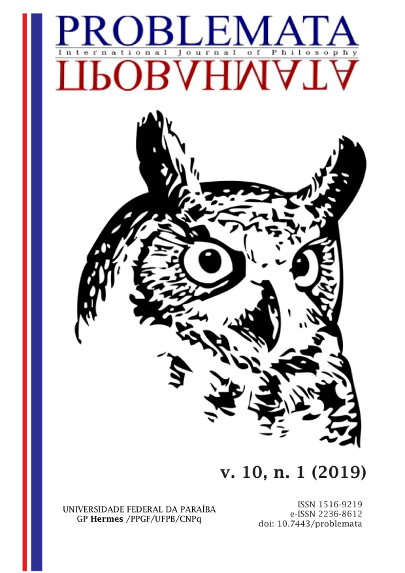HANNAH ARENDT AND THE REVOLUTION NOVUS ORDO SAECLORUM
DOI:
https://doi.org/10.7443/problemata.v10i1.46719Keywords:
Revolution, Restoration, Reform, Freedom, Necessity.Abstract
Revolution is a modern concept, although the ancients used words to designate revolts or rebellions generally seen as moments of turbulence that should be avoided (with the exception of Machiavelli). The modern sense of the word has its origin in astronomy: was used by Copernicus in his fundamental work De revolutionibus orbium coelestium (1543) and indicates the turns that the planets make around the sun. In its beginnings, the term indicated a preordained, irresistible, recurring and cyclic movement. In that sense, it meant a restoration, a return to the rule and to the old (Glorious English Revolution). The change of meaning took place with the American e especially with the French Revolution, when the term took on a new meaning, which will be imposed, that of a new beginning: novus ordo saeclorum. Revolution has come to mean a radical change of paradigm, both in science, in the sense of industrial (technical-scientific) revolution and epistemological revolution (the radical changes of a scientific paradigm according to Kuhn's famous work); as well as in politics and society (cultural revolution). In this essay, we will deal with the relationship that Hannah Arendt establishes between the American and French revolutions, reflecting on the Russian revolution. Arendt takes a more favourable position to the American Revolution, understood like a revolution founded on freedom (Constitutio libertatis) that to the French and Russian revolution, understood like revolutions of the necessity. Thesis controversy that we will try to debate.
Downloads
References
ARENDT, H. Sobre a revolução. São Paulo: Editora Ática; Brasília: Editora UnB, 1988.
ARENDT, H . As origens do totalitarismo. São Paulo: Companhia das Letras, 1989.
ARENDT, H. A Vida do Espírito. São Paulo: Relume Dumará, 1993.
ARENDT, H. Crisis of the Republic. San Diego, New York, London: Harvest Book, 1972
BOBBIO, N. “Reformas e revolução e A revolução entre movimento e mudança”. In BOBBIO, N. Teoria Geral da Política. A filosofia Política e a Lição dos Clássicos. Rio de Janeiro: Elsevier, 2000.
BURKE, E. Reflexões sobre a revolução na França. Brasília: Editora UnB, 1997.
HOBSBAWM, E. A Era das revoluções (1789-1848). São Paulo: Paz e Terra, 2009.
KAUTSKY, K. A ditadura do proletariado. São Paulo: Livraria Editora Ciências Humanas, 1979.
LÖWITH, K. O sentido da história. Lisboa: Edições 70, 1991.
LYRA, R. P. “Kautsky, Lênin e o comunismo soviético”. Cronos, UFRN, Natal, v. 14, n.1, jan./jun., p. 137-163, 2013.
LUXEMBURGO, R. A revolução russa. Petrópolis, RJ: Vozes, 1991.
MARX, K.; ENGELS, F. A ideologia Alemã. São Paulo: Martins Fontes, 2001.
MARX, K.; ENGELS, F. O Manifesto do Partido Comunista. Lisboa: Editora Avanti! 1997.
MARX, K. Contribuição à Crítica de Economia Política. São Paulo: Expresso Popular, 2008.
PAINE, T. Os direitos do homem. Rio de Janeiro: Zahar, 2007.
REIS FILHO, A. D. A Revolução Russa 1917-1921. São Paulo: Brasiliense, 1999.
_________. As revoluções russas e o socialismo soviético. São Paulo: UNESP, 2017.
ROBESPIERRE, M. Rapport sur les idées religieuses et morales. Discours prononcé à la tribune de la Convention le 7 mai 1794. Disponível em: http://www.worldfuturefund.org/wffmaster/Reading/Communism/rob-rel-french.htm Acesso em: 15.01.2018.
SCHMITT, C. Teologia Política. Belo Horizonte: Del Rey, 2006.
TOSI, G. – FRAGOSO, Williard. As críticas de direita e esquerda aos direitos humanos. Problemata: v. 8. n. 1 (2017), p. 122-162.
TOSI, G. De Revolutionibus orbis terrestris, In: TOSI, G. – ALIAGA, L. – FREIRE, R. (orgs). Centenário da Revolução Russa: balanços e reflexões. João Pessoa: Editora da UFPB, 2019.
Downloads
Published
Issue
Section
License
Authors who publish with this journal agree to the following terms:
- Authors retain copyright and grant the journal right of first publication with the work simultaneously licensed under a Creative Commons Attribution License that allows others to share the work with an acknowledgement of the work's authorship and initial publication in this journal.
- Authors are able to enter into separate, additional contractual arrangements for the non-exclusive distribution of the journal's published version of the work (e.g., post it to an institutional repository or publish it in a book), with an acknowledgement of its initial publication in this journal.
-
- Authors are permitted and encouraged to post their work online (e.g., in institutional repositories or on their website) prior to and during the submission process, as it can lead to productive exchanges, as well as earlier and greater citation of published work (See The Effect of Open Access).





